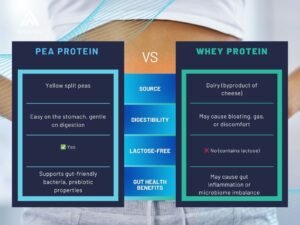
How Your Diet Shapes Your Bowel Movements (and Gut Health)
What you eat directly impacts your digestion, bowel movements, and overall gut health. Struggling with constipation, bloating, or irregularity? The key lies in your diet.

Home » A Fresh Start: Nourishing Your Gut for a Healthier New Year
As we bid farewell to the old year and welcome the new one, many of us embark on a journey of self-improvement through New Year’s resolutions. While weight loss and fitness goals often take the spotlight, let’s shift our focus to a resolution that can significantly impact overall well-being: improving gut health. A healthy gut is the foundation of good health, influencing everything from digestion to immunity. This year, let’s prioritize our gut and make choices that nourish it for a vibrant and thriving new chapter.
The human gut is a bustling ecosystem teeming with trillions of microorganisms, collectively known as the gut microbiome. This intricate community of bacteria, viruses, fungi, and other microbes plays a pivotal role in maintaining our overall health. Picture it as a vibrant metropolis within us, with each microbe contributing to the city’s function and harmony.
The gut microbiome is not just a passive bystander but a dynamic partner influencing various aspects of our well-being. Its functions extend far beyond digestion, impacting nutrient absorption, immune system regulation, and even our mental health. This complex interplay between our bodies and these microorganisms underscores the importance of nurturing a healthy gut for a flourishing and resilient life.
Similar to a thriving city, a diverse population in the gut microbiome is key to its resilience. Different strains of bacteria contribute uniquely to the ecosystem, ensuring a balance that promotes optimal health. When we prioritize foods that support microbial diversity, we foster an environment where beneficial bacteria can thrive, enhancing our digestive processes and fortifying our immune defenses.
Surprisingly, the gut isn’t just a digestive powerhouse—it’s intricately linked to our brain. The gut-brain axis, a bidirectional communication system, allows signals to flow between our gut and central nervous system. This connection means that the state of our gut health can influence our mental well-being. By tending to our gut, we’re not just supporting digestion; we’re nurturing a relationship that impacts our mood, stress levels, and cognitive function.
Unfortunately, our modern lifestyles often present challenges to maintaining a balanced gut microbiome. Factors such as processed foods, antibiotics, and stress can disrupt this delicate equilibrium, potentially leading to an imbalance in the microbial community. Recognizing these challenges is the first step towards making informed decisions to revitalize and prioritize the health of our gut microbiome.
As we embark on the journey to improve gut health in the coming year, understanding the intricacies of the gut microbiome sets the foundation for informed choices. In the subsequent sections, we will explore actionable steps and resolutions that empower you to nurture and support your gut for a healthier, more vibrant life. Get ready to embark on a transformative journey towards a revitalized gut and a renewed sense of well-being.

Now that we’ve delved into the fascinating world of the gut microbiome, let’s explore the first cornerstone of a healthier gut: incorporating fiber-rich foods into your daily life.
Why Fiber Matters: Fiber is the unsung hero of gut health. It’s not just about maintaining regular bowel movements; fiber serves as a feast for the beneficial bacteria in your gut, promoting their growth and activity. This prebiotic function makes fiber-rich foods essential for cultivating a diverse and robust microbiome.
Diversify Your Plate: Whole grains, fruits, vegetables, legumes, and nuts are excellent sources of fiber. Think beyond the familiar and experiment with a rainbow of plant-based foods. Each color represents a unique set of nutrients and compounds that contribute to the overall health of your gut microbiome. Challenge yourself to include a variety of colors in each meal.
Whole Grains: Opt for whole grains like quinoa, brown rice, oats, and whole wheat. These grains contain more fiber and nutrients than their refined counterparts, providing sustained energy and promoting gut health.
Abundant Vegetables: Make vegetables the star of your plate. Load up on leafy greens, cruciferous vegetables like broccoli and Brussels sprouts, and vibrant bell peppers. These vegetables are not only rich in fiber but also packed with vitamins and antioxidants that support overall well-being.
Fruitful Choices: Incorporate a mix of fruits into your daily diet. Berries, apples, pears, and kiwi are not only delicious but also offer a generous dose of fiber, vitamins, and natural sweetness.
Legumes and Nuts: Beans, lentils, and nuts are versatile additions to meals, providing both fiber and plant-based proteins. Snack on a handful of almonds or add chickpeas to salads for a satisfying boost of nutrition.
Transitioning to a fiber-rich diet doesn’t have to be overwhelming. Start by setting achievable goals, such as incorporating one new fiber-rich food each week. Experiment with different cooking methods and recipes to discover what suits your taste buds. Remember, it’s about progress, not perfection.
As you prioritize fiber in your diet, you’re not only benefiting your gut but also positively impacting your overall health. Improved digestion, enhanced nutrient absorption, and a more stable energy level are just a few of the rewards that come with a fiber-fueled lifestyle. This New Year, let fiber be your ally in cultivating a gut environment where health and vitality thrive.

Now that we’ve laid the foundation with fiber, let’s explore another dimension of gut health: the world of fermented foods. These culinary delights not only tantalize the taste buds but also offer a powerhouse of probiotics, the beneficial bacteria essential for a well-balanced gut microbiome.
Unlocking Probiotics: Fermented foods undergo a natural process of fermentation, where beneficial bacteria transform sugars and starches into organic acids. This transformative process not only enhances flavor but also populates the food with probiotics, the friendly bacteria that confer numerous health benefits.
Diverse Fermented Options: Embrace a variety of fermented foods to ensure a rich spectrum of probiotic strains. Here are some delicious options to consider:
Yogurt: A classic probiotic source, yogurt contains live cultures like Lactobacillus and Bifidobacterium. Opt for plain, unsweetened varieties for maximum benefits.
Kefir: This fermented milk drink is not only rich in probiotics but also provides an extra dose of calcium and vitamins. Experiment with different flavors or try plant-based kefir options if you’re lactose intolerant.
Sauerkraut: Fermented cabbage is a staple in many cultures. Packed with probiotics, sauerkraut is not only a flavorful addition to meals but also contributes to gut health.
Kimchi: A staple in Korean cuisine, kimchi is a spicy fermented cabbage dish that not only adds a kick to your meals but also introduces a diverse range of probiotics to your gut.
Kombucha: A fizzy, fermented tea, kombucha is gaining popularity for its refreshing taste and probiotic content. Explore different flavors and find the one that delights your palate.
Start Small: If you’re new to fermented foods, introduce them gradually to allow your digestive system to adjust. Begin with small servings a few times a week and gradually increase as your taste buds acclimate.
Homemade Goodness: Consider making your own fermented foods at home. This not only allows you to control the ingredients but also ensures a fresh supply of probiotics. Experiment with recipes and find what suits your preferences.
Pairing Possibilities: Incorporate fermented foods into your meals creatively. Add a dollop of yogurt to your morning smoothie, top your salads with sauerkraut, or enjoy kombucha as a refreshing afternoon beverage.
By incorporating fermented foods into your daily diet, you’re not only treating your taste buds but also fostering a harmonious environment within your gut. Probiotics from fermented foods contribute to a balanced microbiome, supporting digestion, immune function, and even mental well-being. As you embark on this journey of gut-nourishing resolutions, let the delightful world of fermented foods be your ally in achieving a healthier and more vibrant you in the coming year. Cheers to the joy of gut harmony!

As we continue our quest for a healthier gut in the new year, it’s time to turn our attention to a fundamental aspect of overall well-being: hydration. While we often associate hydration with quenching our thirst, its impact on the gut goes far beyond that. Proper hydration is a key player in maintaining the health and integrity of the gastrointestinal tract.
Mucosal Maintenance: Adequate hydration is crucial for the maintenance of the mucosal lining of the intestines. This lining serves as a protective barrier, preventing harmful substances from entering the bloodstream while allowing the absorption of essential nutrients. When well-hydrated, this mucosal barrier functions optimally, contributing to a healthy gut.
Supporting Digestive Processes: Water plays a vital role in the digestive process. It helps break down food, facilitating the absorption of nutrients in the intestines. Think of water as the lubricant that keeps the gears of digestion turning smoothly, ensuring that your body can extract the maximum benefit from the foods you consume.
Consistent Intake: Aim for a consistent intake of water throughout the day. Carry a reusable water bottle with you to make it easier to stay hydrated, whether you’re at work, running errands, or relaxing at home.
Infuse with Flavor: If plain water feels monotonous, infuse it with natural flavors. Add slices of citrus fruits, cucumber, mint, or berries to enhance the taste. Herbal teas are another hydrating option with added health benefits.
Monitor Your Urine: A simple but effective way to gauge your hydration status is to monitor the color of your urine. Clear or light yellow urine is a good indicator of proper hydration, while dark yellow may signal dehydration.
Balance with Electrolytes: In certain situations, such as intense physical activity or excessive sweating, consider beverages that contain electrolytes. These help maintain the body’s fluid balance and support optimal muscle function.
In addition to plain water, herbal teas can be a delightful and healthful way to stay hydrated. Some herbal teas offer specific benefits for gut health:
Peppermint Tea: Known for its soothing properties, peppermint tea may help alleviate digestive discomfort and support a calm gut.
Ginger Tea: Ginger has anti-inflammatory properties and can aid digestion, making it a great choice for those looking to support their gut health.
Chamomile Tea: With its gentle and calming effects, chamomile tea may help ease digestive issues and promote overall relaxation.
By prioritizing hydration, you’re not only quenching your thirst but also nurturing a resilient and well-functioning gut. As you embark on this aspect of your gut health journey, remember that every sip contributes to the foundation of your overall well-being. So, raise your water bottle or teacup to a hydrated gut and a healthier you in the new year!
As we navigate the path to a healthier gut in the new year, let’s explore the often-overlooked but profoundly impactful practice of mindful eating. In a world where our lives are fast-paced and filled with distractions, taking the time to savor and appreciate our meals can make a significant difference in our digestive health.
Engaging the Senses: Mindful eating involves fully engaging your senses during meals. Take the time to appreciate the colors, textures, and aromas of your food. By slowing down and savoring each bite, you create a deeper connection with the act of eating.
Listening to Your Body: Pay attention to your body’s hunger and fullness cues. Mindful eating encourages you to eat when you’re hungry and stop when you’re satisfied, fostering a more intuitive and responsive approach to nourishing your body.
Improved Digestion: When we eat mindfully, our bodies are better prepared for the process of digestion. Chewing food thoroughly and appreciating each bite kickstarts the digestive enzymes in our saliva, aiding in the breakdown of nutrients.
Reduced Stress Impact: Stress can negatively impact gut health. Mindful eating, by promoting relaxation during meals, can help mitigate the effects of stress on the digestive system. Create a calm environment, free from distractions, to fully focus on your meal.
Create a Ritual: Establish a mealtime ritual that signals the transition from a hectic day to a nourishing break. This could be lighting a candle, playing soft music, or taking a few deep breaths before you begin to eat.
Silence the Distractions: Turn off the TV, put away electronic devices, and create a designated space for meals. Minimizing distractions allows you to be fully present with your food and the experience of eating.
Chew with Purpose: Take the time to chew each bite thoroughly. Not only does this aid in digestion, but it also allows you to truly taste and appreciate the flavors of your food.
Express Gratitude: Before diving into your meal, take a moment to express gratitude for the nourishment before you. This simple practice can shift your mindset and create a positive connection with the act of eating.
Extend the principles of mindful eating beyond traditional mealtimes. Pay attention to your snacking habits, and choose nutrient-dense snacks. Consider keeping a food journal to track not only what you eat but also your feelings and sensations related to eating.
By incorporating mindful eating practices into your daily life, you’re not just nourishing your gut; you’re fostering a holistic approach to well-being. The benefits extend beyond digestion, influencing your relationship with food, stress levels, and overall enjoyment of life. As you embrace mindful eating as a resolution for the new year, savor each moment and relish the positive impact on your gut health and beyond. Cheers to a more mindful and harmonious journey to a healthier you!

As we continue our expedition toward a healthier gut in the new year, it’s crucial to address a common culprit that can disrupt the delicate balance of our gut microbiome: processed foods and excessive sugars. These dietary elements, prevalent in many modern diets, can have a significant impact on gut health, inflammation levels, and overall well-being.
Inflammatory Impact: Processed foods often contain additives, preservatives, and artificial ingredients that can trigger inflammation in the body, including the gastrointestinal tract. Chronic inflammation is associated with various health issues, including compromised gut health.
Altering Gut Microbiota: The overconsumption of sugars, especially refined sugars, can lead to an imbalance in the gut microbiome. Harmful bacteria thrive on sugar, potentially crowding out the beneficial bacteria essential for a healthy gut environment.
Read Labels: Familiarize yourself with food labels and ingredients lists. Opt for whole, unprocessed foods whenever possible, and be mindful of added sugars and artificial additives.
Choose Whole Foods: Prioritize a diet rich in whole foods such as fruits, vegetables, lean proteins, and whole grains. These nutrient-dense options provide essential vitamins, minerals, and fiber without the detrimental effects associated with processed foods.
Limit Added Sugars: Be conscious of your sugar intake. Reduce the consumption of sugary beverages, snacks, and desserts. When sweetening foods or beverages, consider healthier alternatives like honey, maple syrup, or natural fruit sugars in moderation.
Cook at Home: Taking control of your food preparation allows you to choose fresh, wholesome ingredients and avoid the hidden additives present in many processed foods. Experiment with simple and nutritious recipes to make home-cooked meals a regular part of your routine.
Set Realistic Goals: Rather than attempting a drastic dietary overhaul, set realistic and achievable goals. Gradual changes are more likely to become lasting habits. Consider starting with one aspect, such as reducing sugary snacks, and build from there.
Mindful Substitutions: Explore healthier alternatives to processed and sugary favorites. Whole fruits can satisfy a sweet craving, and homemade snacks can replace processed, pre-packaged options.
By minimizing processed foods and sugars, you’re not just improving your gut health; you’re laying the groundwork for a healthier, more resilient body. Your gut microbiome will thank you for the nutrient-dense, whole foods that nourish both your digestive system and your overall well-being. As you embark on this resolution, savor the positive changes, relishing the journey to a happier and healthier gut in the coming year!
As we approach the final frontier of our journey toward a healthier gut in the new year, let’s explore the role of supplements in fortifying and supporting our gut health. While a well-balanced diet rich in whole foods should be the cornerstone of gut wellness, certain circumstances may warrant the consideration of supplements to address specific needs and challenges.
Probiotics: Considered the superheroes of gut health, probiotics are live microorganisms that confer various health benefits when consumed in adequate amounts. These beneficial bacteria can be found in fermented foods, but supplementing with high-quality probiotics can be beneficial, especially after a course of antibiotics or in the presence of digestive issues.
Prebiotics: Prebiotics are non-digestible fibers that serve as food for the beneficial bacteria in your gut. While many whole foods contain prebiotics, supplements can provide a concentrated source to support the growth and activity of probiotics.
Digestive Enzymes: For those experiencing digestive discomfort or conditions such as irritable bowel syndrome (IBS), digestive enzyme supplements can assist in breaking down food more efficiently, aiding the digestive process.
L-Glutamine: This amino acid plays a crucial role in maintaining the integrity of the intestinal lining. L-Glutamine supplements may be beneficial for those with conditions such as leaky gut syndrome or other gastrointestinal issues.
Individualized Approach: Before incorporating any supplements into your routine, it’s essential to consult with a healthcare professional. They can help assess your specific needs, considering factors such as your overall health, dietary habits, and any existing medical conditions.
Quality Matters: If supplements are recommended, opt for high-quality products from reputable brands. The efficacy of supplements depends on their formulation and the viability of the live cultures, especially in the case of probiotics.
Start Gradually: If introducing supplements, start with one at a time to monitor their effects on your body. Gradual integration allows you to observe how each supplement influences your gut health.
Track and Adjust: Keep a journal to track changes in your gut health and overall well-being. If you experience any adverse effects or improvements, share this information with your healthcare professional to make necessary adjustments.
Supplements should complement, not replace, a nutrient-dense and well-balanced diet. Embrace the synergy of whole foods and targeted supplements to create a comprehensive approach to gut wellness. Your gut, often referred to as your “second brain,” plays a vital role in your overall health. As you navigate the realm of gut-boosting supplements, do so with the guidance of your healthcare professional, ensuring a personalized and effective strategy for a thriving gut in the new year. Here’s to a year filled with health, vitality, and a harmonious gut!

As we culminate our journey toward a healthier gut in the new year, it’s time to weave together the threads of our resolutions into a holistic approach. Embracing a comprehensive lifestyle that encompasses nutrition, mindfulness, and overall well-being will not only fortify your gut but foster a balanced and harmonious life.
Stress Management: Acknowledge the profound connection between the mind and the gut. Chronic stress can take a toll on your digestive system. Incorporate stress-reducing practices such as meditation, deep breathing exercises, or yoga into your routine. A calm mind fosters a calm gut.
Adequate Sleep: Quality sleep is a cornerstone of overall health, and it plays a significant role in supporting gut function. Prioritize a consistent sleep schedule, create a relaxing bedtime routine, and ensure your sleep environment is conducive to restful sleep.
Regular Physical Activity: Exercise is not only beneficial for cardiovascular health but also supports a thriving gut. Engage in activities you enjoy, whether it’s a brisk walk, yoga, or weight training. Regular movement contributes to a healthy digestive system and overall well-being.
Hydration as a Ritual: Elevate your hydration routine to a mindful ritual. Begin your day with a glass of water, infuse it with refreshing flavors, and savor herbal teas throughout the day. Hydration isn’t just about quenching thirst; it’s a conscious act of nurturing your body.
Connection with Nature: Spend time outdoors, connecting with nature. Whether it’s a stroll in the park, gardening, or simply basking in sunlight, nature has a calming effect on the body and mind, indirectly benefiting your gut health.
Journaling: Maintain a gut health journal to document your journey. Record dietary changes, mindful eating experiences, and any shifts in how you feel. This reflective practice can provide valuable insights into what works best for your unique body and lifestyle.
Regular Check-Ins: Schedule regular check-ins with your healthcare professional to discuss your gut health journey. Share your experiences, challenges, and successes, allowing them to offer guidance and adjustments as needed.
Small Wins Matter: Celebrate the small victories along the way. Whether it’s consistently choosing whole foods, completing a week of mindful eating, or incorporating a new form of exercise, acknowledge and appreciate your progress.
Community Support: Engage with others who share similar health goals. Join online communities, attend local events, or involve friends and family in your journey. A supportive community can provide motivation, inspiration, and a sense of accountability.
As you embark on this holistic approach to gut health in the new year, remember that it’s not about perfection but progress. Each choice you make contributes to the intricate tapestry of your well-being. By weaving together mindful nutrition, stress management, sleep, and physical activity, you’re creating a symphony of health that resonates throughout your entire being. Here’s to a year filled with vibrant gut health, holistic well-being, and a journey of self-discovery!
As we conclude our exploration of gut health resolutions for the new year, it’s essential to focus on sustainability and long-term well-being. Establishing a foundation for a resilient gut is not a temporary endeavor but a commitment to a lifestyle that nurtures your body from the inside out.
Consistency Over Perfection: Rather than aiming for perfection, prioritize consistency in your gut health journey. Sustainable habits are built over time, and small, positive changes can lead to lasting results. Be patient with yourself and embrace the process.
Adapting to Your Needs: Your body is unique, and what works for one person may not work for another. Pay attention to how different foods and lifestyle choices impact your gut. Be open to adapting your approach based on what makes you feel your best.
Listen to Your Body: Embrace intuitive eating, a mindful approach to food that involves listening to your body’s hunger and fullness cues. Pay attention to how specific foods make you feel and adjust your choices accordingly. Your body often communicates its needs if you’re attuned to its signals.
Mindful Indulgences: Allow yourself occasional indulgences without guilt. The key is moderation and savoring these treats mindfully. Being overly restrictive can lead to feelings of deprivation, potentially affecting your mental and emotional well-being.
Continued Learning: Stay informed about the latest research and insights into gut health. The field is continually evolving, and new discoveries can enhance your understanding of how to best support your digestive system.
Experiment and Explore: Your gut health journey is a dynamic process. Experiment with different foods, recipes, and lifestyle practices to find what resonates with you. Stay curious and open to discovering what truly nourishes your body and soul.
Engage with Professionals: Maintain regular check-ins with healthcare professionals, including dietitians, nutritionists, and other specialists. Their expertise can provide personalized guidance and ensure that your gut health strategy aligns with your overall well-being.
Share the Journey: Cultivate a supportive network of friends, family, or online communities who share similar health goals. Sharing experiences, recipes, and challenges creates a sense of community and encourages collective growth.
In nurturing your gut health for the long haul, you’re investing in a future filled with vitality and well-being. As you continue to weave mindful practices, nutrition, and holistic well-being into your daily life, remember that every positive choice contributes to the flourishing ecosystem within. Here’s to a year of sustained gut health, self-discovery, and the ongoing journey toward your healthiest, happiest self!

What you eat directly impacts your digestion, bowel movements, and overall gut health. Struggling with constipation, bloating, or irregularity? The key lies in your diet.

You’ve been pooping wrong your entire life—and it’s wrecking your gut. Dr. Gina Sam’s poop method reveals the shockingly simple, doctor-backed fix that makes straining

Struggling with bloating after protein shakes? Your choice of protein could be affecting your gut health. Pea protein is gentle and gut-friendly, while whey protein

Table of Contents <svg aria-hidden=”true” viewBox=”0 0 448 512″ xmlns=”http://www.w3.org/2000/svg”><path d=”M207.029 381.476L12.686 187.132c-9.373-9.373-9.373-24.569 0-33.941l22.667-22.667c9.357-9.357 24.522-9.375 33.901-.04L224 284.505l154.745-154.021c9.379-9.335 24.544-9.317 33.901.04l22.667 22.667c9.373 9.373 9.373 24.569 0 33.941L240.971

Happy Poops.
What about your friends?